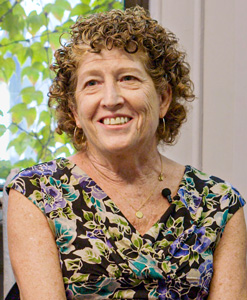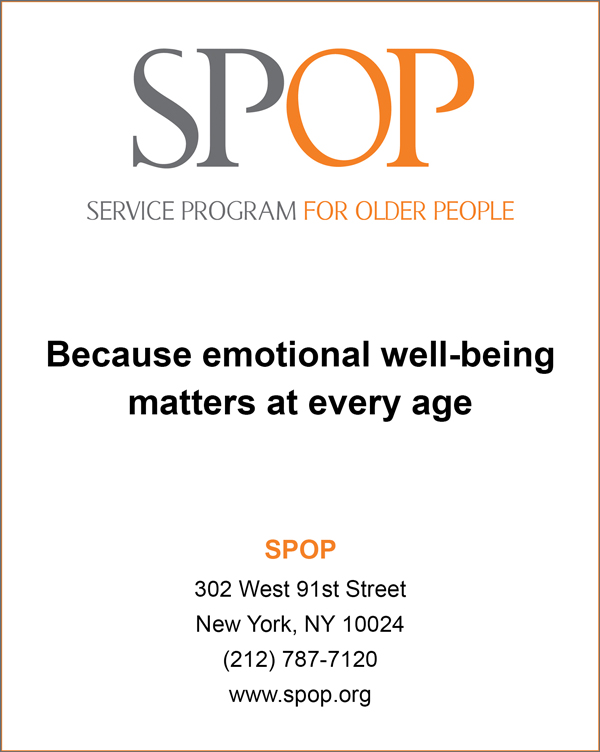The past three years have brought about the greatest transformation in behavioral healthcare practices that I have seen in four decades.
I have served as Chief Executive Officer of Service Program for Older People (SPOP) for 33 years. We provide community-based behavioral healthcare for adults ages 55 and older in New York City. Our programs include a New York State-licensed Article 31 Clinic, which offers outpatient therapy, psychiatry, and medication management, and a Personalized Recovery Oriented Services (PROS) program, which offers group-based support for adults with serious mental illness. We serve 2,000 adults each year, and our client population is overwhelmingly low-income, isolated, and frail.

Nancy Harvey, LMSW
During my tenure, SPOP had already evolved from a neighborhood agency to a city-wide resource with clinic satellite sites throughout Manhattan, the Bronx, and Brooklyn, relationships with the leading hospital systems in the city, and a partnership with the New York City Department for the Aging to provide mental health services on-site at high-need older adult centers. We had also garnered expertise in aging and mental health, and we had developed a robust program of workplace and community-based training for those who work with an older population.
As we all know, everything changed in March of 2020. The most immediate and far-reaching change was the emergency coverage of public-payor coverage of telehealth for behavioral health services, including sessions by telephone. SPOP was one of the first agencies in the metropolitan New York area to transition fully to telehealth, and our clients experienced no interruption of service. We supplied equipment to all staff, provided training to clients and staff in the use of our HIPAA-compliant Zoom platform, and re-assigned staff to make check-in or update phone calls to all clients.
Telehealth has had a profound impact on the way we work – for our client population it has been a tremendous success, with easy access to services without the challenges of inclement weather, transportation, or frail health – but it is just one of the ways we adapted. We also remained in close contact with our community partners and used this time to develop strategies to meet unprecedented demand and increasingly complex needs in the community.
We quickly realized that we needed to rethink the role of our frontline staff, including front desk staff, intake staff, and schedulers. We assembled a team of bilingual staff to serve as ad hoc telehealth trainers and tech support for clients. Our intake department updated its resource guide and made certain that frontline workers were prepared to assess incoming calls, identify urgent or emergency situations, and connect people to other services in the community, particularly emergency meals, and medical care. As we became aware of the tremendous pressure our clinicians were experiencing, we created a structure in which each client was matched with a frontline staff member, with instructions to call this contact with all inquiries other than therapy-related issues. Finally, we created a Client Navigator position within our intake department to provide enhanced support for new and established clients.
This experience has been transformational. Our frontline staff have developed new skills and report that their work is more varied and gratifying. Most important, clients have a point person who is available during business hours, and incoming clients are connected promptly to other community-based services to support aging in place.
The pandemic coincided with one of the worst periods of race relations in the country in recent years, and during this time we experienced a dramatic increase in PTSD and other disorders associated with racism and lifelong discrimination. For many older adults who were already struggling with loss and grief, isolation, substance misuse, or depression, this compounded their psychological needs, often creating a situation where clients were unable to untangle one challenge from another. We used this as an opportunity to create a Clinic Anti-Racism Lens Initiative, with a goal to improve clinic practice and create a more inclusive environment for staff and clients. We have created a library of resources and a series of training workshops at the intersection of aging, discrimination, ageism, disability, racism, and diversity, which we offer to all of our clinicians. In addition, we updated our treatment plan to incorporate and community and cultural strengths, and our psychosocial assessment was expanded to include questions about cultural background and identity, culture-specific coping skills, religion, and spirituality. The outcomes include expanded clinical skills for our staff and a more culturally-responsive therapeutic approach.
Older adults were disproportionately impacted by the pandemic, with many continuing to suffer from unresolved grief, isolation, depression, and other disorders. Our professional community was also impacted, and we have seen a worrisome increase in resignations or early retirement, often as a result of compassion fatigue or burnout. We have responded to this urgent challenge by expanding our training program to include workshops focused on self-care specifically for those who work with an older population, as well as community-based trainings for clergy and lay leaders in the faith community, public library patrons, and diverse programs that serve older adults, with a goal to expand the knowledge base and provide support for those working in the field.
We recognized that, while telehealth enabled most clients to engage fulling in the therapeutic process, there were others who needed to return to in-person sessions. We reopened our offices as soon as it was safe to do so, and we developed a paradigm to assess each client and determine the optimum ratio of in-person and virtual sessions, taking into consideration the client’s treatment plan, transportation needs, and medical condition.
Finally, we have expanded our roster of therapy groups, with a goal to provide social interaction and support rapid engagement with clients during periods of high demand. This project has been a great success, with new groups on such topics as managing chronic pain, long-term grief, decluttering, mindfulness, recovery, or skills training.
One silver lining of this experience has been a broader conversation about behavioral health and a general reduction in stigma or fear of treatment. We find that older adults are more open and receptive to treatment than ever before. This “normalization” of behavioral health awareness and treatment is all to the good of our profession and the society overall.
I expect that we will continue to build upon the work of the past three years. I look forward to developing new strategies and community partnerships to reach those who are most isolated and vulnerable, and to finding new ways to provide treatment and other services that enable older New Yorkers to live independently.
Nancy Harvey, LMSW, has served as the Chief Executive of Service Program for Older People (SPOP) in New York City since 1990. During her tenure SPOP has grown from a neighborhood-based agency primarily serving homebound seniors to a regional resource for affordable mental health care for adults age 55 and older. A graduate of the State University of New York system, she holds a B.A. from SUNY New Paltz and M.S.W. from SUNY Albany. She has been an advocate for increasing access to geriatric mental health care in the region and has developed outreach strategies in partnership the NYC Department for the Aging, NYC Office of Mental Health and Hygiene, Mount Sinai Health System, New York-Presbyterian hospital system, SAGE/Services and Advocacy for GLBT Elders, VISIONS/Services for the Blind and Visually Impaired, and dozens of other organizations. She is a member of the Board of Directors of The Coalition for Behavioral Health Agencies in New York City, where she also serves as Chair of the Healthy Aging Committee.
To learn more about SPOP please visit www.spop.org or call (212) 787-7120.







